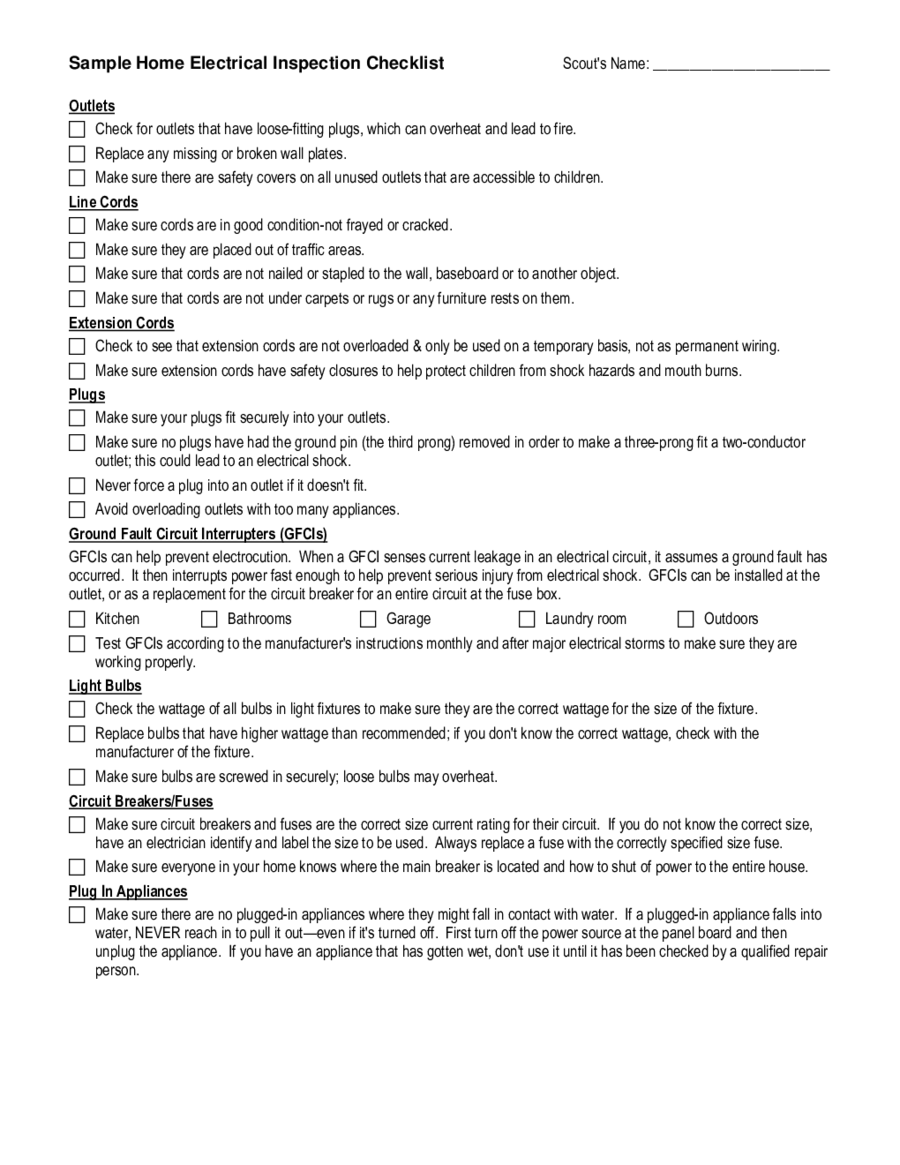Fillable Printable Electricity-Home-Checklist
Fillable Printable Electricity-Home-Checklist

Electricity-Home-Checklist

Sample Home Electrical Inspection Checklist Scout's Name: ________________________
Outlets
Check for outlets that have loose-fitting plugs, which can overheat and lead to fire.
Replace any missing or broken wall plates.
Make sure there are safety covers on all unused outlets that are accessible to children.
Line Cords
Make sure cords are in good condition-not frayed or cracked.
Make sure they are placed out of traffic areas.
Make sure that cords are not nailed or stapled to the wall, baseboard or to another object.
Make sure that cords are not under carpets or rugs or any furniture rests on them.
Extension Cords
Check to see that extension cords are not overloaded & only be used on a temporary basis, not as permanent wiring.
Make sure extension cords have safety closures to help protect children from shock hazards and mouth burns.
Plugs
Make sure your plugs fit securely into your outlets.
Make sure no plugs have had the ground pin (the third prong) removed in order to make a three-prong fit a two-conductor
outlet; this could lead to an electrical shock.
Never force a plug into an outlet if it doesn't fit.
Avoid overloading outlets with too many appliances.
Ground Fault Circuit Interrupters (GFCIs)
GFCIs can help prevent electrocution. When a GFCI senses current leakage in an electrical circuit, it assumes a ground fault has
occurred. It then interrupts power fast enough to help prevent serious injury from electrical shock. GFCIs can be installed at the
outlet, or as a replacement for the circuit breaker for an entire circuit at the fuse box.
Kitchen Bathrooms Garage Laundry room Outdoors
Test GFCIs according to the manufacturer's instructions monthly and after major electrical storms to make sure they are
working properly.
Light Bulbs
Check the wattage of all bulbs in light fixtures to make sure they are the correct wattage for the size of the fixture.
Replace bulbs that have higher wattage than recommended; if you don't know the correct wattage, check with the
manufacturer of the fixture.
Make sure bulbs are screwed in securely; loose bulbs may overheat.
Circuit Breakers/Fuses
Make sure circuit breakers and fuses are the correct size current rating for their circuit. If you do not know the correct size,
have an electrician identify and label the size to be used. Always replace a fuse with the correctly specified size fuse.
Make sure everyone in your home knows where the main breaker is located and how to shut of power to the entire house.
Plug In Appliances
Make sure there are no plugged-in appliances where they might fall in contact with water. If a plugged-in appliance falls into
water, NEVER reach in to pull it out—even if it's turned off. First turn off the power source at the panel board and then
unplug the appliance. If you have an appliance that has gotten wet, don't use it until it has been checked by a qualified repair
person.

Sample Home Electrical Inspection Checklist Scout's Name: ________________________
Sample Home Electrical Inspection Checklist (page 2)
Appliances
If an appliance repeatedly blows a fuse, trips a circuit breaker or if it has given you a shock, unplug it and have it repaired or
replaced.
Entertainment/Computer Equipment
Check to see that the equipment is in good condition and working properly. Look for cracks or damage in wiring, plugs and
connectors.
Use a surge protector bearing the seal of a nationally recognized certification agency.
Outdoor Safety
Electric-powered mowers and other electric tools should not be used in the rain, on wet grass or in wet conditions.
Inspect power tools & electric lawn mowers before each use for frayed power cords, broken plugs & cracked or broken
housings. If any part is damaged, stop using it immediately. Repair it or replace it.
Always use an extension cord marked for outdoor use and rated for the power needs of your tools.
Remember to unplug all portable power tools when not in use.
When using ladders, watch out for overhead wires and power lines. Stay at least 10 feet from all overhead lines.
Lightning
During an electrical storm, do not use appliances (i.e., hairdryers, toasters and radios) or telephones (except in an
emergency); do not take a bath or shower;
Keep batteries on hand for flashlights and radios in case of a power outage.
Use surge protectors on electronic devices, appliances, phones, fax machines and modems.
Space Heaters
Space heaters are meant to supply supplemental heat. Keep space heaters at least 3 ft. away from any combustible
materials such as bedding, clothing, draperies, furniture and rugs.
Don't use space heaters in rooms where children are unsupervised and remember to turn off and unplug when not in use.
Do not use space heaters with extension cords; plug directly into an outlet on a relatively unburdened circuit.
Halogen Floor Lamps
Halogen floor lamps operate at much higher temperatures than a standard incandescent light bulb. Never place a halogen
floor lamp where it could come in contact with draperies, clothing or other combustible materials.
Be sure to turn the lamp off whenever you leave the room for an extended period of time.
Never use torchiere lamps in children's bedrooms or playrooms. Consider using cooler fluorescent floor lamps.



